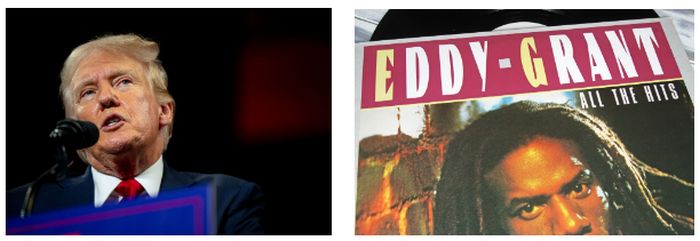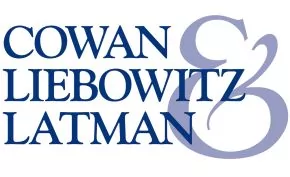- within Cannabis & Hemp topic(s)
- with readers working within the Healthcare industries

On Sept. 11, 2024, Senior Judge Thomas Thrash Jr. of the Northern District of Georgia granted plaintiffs' motion for a preliminary injunction in Isaac Hayes Enterprises v. Trump, No. 24-cv-3639 (N.D. Ga. Sept. 11, 2024).
The Parties
Isaac Lee Hayes Jr. was an American singer, songwriter, composer, and actor. With his longtime collaborator David Porter, Hayes was a pillar of the legendary soul music label Stax Records, serving as an in-house songwriter as well as a session musician and record producer. His post-Stax accomplishments ranged widely, from writing, performing and recording the "Theme From 'Shaft,'" winner of the 1972 Academy Award for Best Original Song, to providing the voice of Chef on "South Park." Isaac Hayes was inducted into the Rock and Roll Hall of Fame in 2002, and into the Songwriters Hall of Fame in 2005.
The string of Stax hit songs co-written by Hayes and Porter, and performed by Sam & Dave, include "When Something Is Wrong with My Baby," (1966), "Soul Man," (1967), and "I Thank You," (1968). Another of the Hayes-Porter hit songs is "Hold On, I'm Comin'," recorded by Sam & Dave in 1966 and released to widespread success. Sam & Dave's recording of "Hold On" peaked at number one on the Billboard Hot R&B singles chart and at number 21 on the Billboard Hot 100. Hayes's and Porter's jointly-owned copyright in "Hold On" was registered in 1968, and the registration was timely renewed in 1996.
Plaintiff Isaac Hayes Enterprises (IHE), self-described as "an entertainment, media, music licensing and music publishing company for [co-plaintiff] the estate of Isaac Hayes," claimed to be the owner of an exclusive copyright interest in and to "Hold On."
In the words of the court, "Defendant Donald Trump is the Republican nominee for president. Defendant Donald J. Trump for President 2024, Inc. is the campaign organization that is seeking to get defendant Trump elected in the upcoming election."
The Trump campaign began regularly publicly performing "I'm Coming" in 2020, as "outro" music for appearances and campaign events in support of defendant Trump. According to plaintiffs, a cease-and-desist letter was sent to the Trump campaign in 2020 by the then-music publishers of "Hold On," but was ignored by the Trump campaign.
Background: The Public Performance Right and the PROs
The Copyright Act reserves to the copyright owner, "in the case of musical ... works," the exclusive right to "perform the copyrighted work publicly" and to authorize others to do so. 17 U.S.C. Section 106(4). This performance right is not limited to live performances of the musical work, but may also be infringed by the playing of a recording, such as at a political event. For the most part, entities that wish to publicly perform copyrighted songs obtain licenses from one or more of the "performing rights organizations" (PROs) such as the American Society of Composers, Authors and Publishers (ASCAP), Broadcast Music, Inc. (BMI), and SESAC, Inc. The PROs acquire nonexclusive public performance rights through agreements with musical-work copyright owners such as songwriters and music publishers. The PROs in turn act as licensing agents on behalf of the copyright owners, granting to music users, such as terrestrial and digital broadcasters and nightclub and concert hall operators, the right to publicly perform any of the millions of songs in the PROs' respective repertoires by means of "blanket license agreements." When a musical composition is played at a club or concert hall, the venue will have obtained a public performance license from the applicable PRO – in the case of "Hold On," BMI. The PRO collects license fees from the venue, allocates the resulting income among its members and distributes it to them as public performance royalties.
The blanket license agreements offered by BMI differ according to the music-user licensee's "business type," which includes such categories as "Bar, Restaurant or Brewery," "Fitness Club," "Retail" and, of relevance here, "Political Entities or Organizations." According to BMI, its "Political Entities license authorizes the public performance of over 22.4 million musical works in BMI's repertoire at events and functions hosted by political campaigns and organizations." Unique among BMI's license categories, the Political Entities license "includes a provision that permits BMI to exclude a musical work(s) from the license should BMI receive an objection from a songwriter or publisher regarding its use by the licensee. If that occurs, BMI will notify the licensee that the particular musical work has been removed from license and is no longer authorized by BMI to perform the musical work." The Trump campaign entered into a BMI Music License for Political Entities or Organizations on Nov. 30, 2022.
On June 6, 2024, a representative of BMI emailed the Trump campaign's deputy campaign manager, informing the campaign that "Hold On, I'm Comin'" had been excluded from the Trump campaign's Political Entities license pursuant to a request made on behalf of Porter. The Trump campaign nevertheless continued to publicly perform "Hold On, I'm Comin'" at campaign events. Litigation ensued.
On Aug. 21, 2024 the plaintiffs moved for a preliminary injunction, requesting the court to order the Trump defendants to stop using "Hold On" without a license, and to take down any videos they had posted that contained "Hold On, I'm Comin'." The court held a hearing on the motion for preliminary injunction on Sept. 3.
Preliminary Injunction: The Legal Standard
Under Eleventh Circuit law, to obtain preliminary injunctive relief the moving party must show: (1) a substantial likelihood of success on the merits; (2) that it will suffer irreparable injury unless the injunction is issued; (3) that the threatened injury outweighs possible harm that the injunction may cause the opposing party; and (4) that the injunction would not disserve the public interest. GeorgiaCarry.Org v. U.S. Army Corps of Eng'rs, 788 F.3d 1318, 1322 (11th Cir. 2015). A preliminary injunction is "an extraordinary and drastic remedy that should not be granted unless the movant clearly carries its burden of persuasion on each of these prerequisites." SunTrust Bank v. Houghton Mifflin, 252 F.3d 1165, 1166 (11th Cir. 2001).
A. Likelihood of Success on the Merits
To establish copyright infringement, two elements must be proven: (1) ownership of a valid copyright, and (2) a violation of one or more of the copyright owner's exclusive rights under 17 U.S.C. Section 106. The court found the plaintiffs likely to succeed in proving both elements.
Regarding ownership, the Trump defendants argued that IHE had assigned away its ownership interest in "Hold On, I'm Comin'" to third party Primary Wave Music IP Fund 3, LP, and had not otherwise shown that it had an ownership interest in the song. Plaintiffs countered with evidence that Hayes's widow and son recovered Hayes's ownership share of U.S. copyright rights in "Hold On" pursuant to 17 U.S.C. Section 304(c), which permits authors or their statutory successors to terminate pre-1978 grants of copyright during a five-year period beginning 56 years from the date on which the copyright was originally secured. Hayes's statutory heirs terminated Hayes's 1966 copyright grant on March 15, 2022, 56 years after the copyright in "Hold On, I'm Comin'" was secured. As a result, the Hayes heirs and IHE regained a 50% ownership interest in the "Hold On" copyright. In 2023 IHE assigned half of that interest to Primary Wave, resulting in each owning a 25% interest in the U.S. copyright. Based on that unrebutted evidence, the court concluded that the Plaintiffs had met their burden of demonstrating ownership of the copyright in "Hold On, I'm Comin'."
As to the alleged infringing acts, the defendants did not contest that they had been using "Hold On, I'm Comin'" at their campaign events. Instead, they argued (a) that they had a license to perform the song and (b) that the use of "Hold On, I'm Comin'" in certain videos they have posted constituted fair use. The court declined to rule on the defendants' fair use defense on the pleadings before it.
In support of their license defense, defendants rather incongruously provided a copy of the Nov. 30, 2022 BMI Political Entities license agreement, Paragraph 2(a) of which states that "one or more work(s) or catalog(s) of works by one or more BMI songwriter(s) may be excluded from this license if notice is received by BMI that such BMI songwriter(s) objects to the use of their copyrighted work(s) for the intended uses by licensee." Given that BMI notified the Trump campaign on June 6, 2024 that one of the songwriters for "Hold On, I'm Comin'" objected to the defendants' use, and that it was "excluded from the agreement effective immediately," the court found it likely that the plaintiffs would be able to show that the Trump campaign's post-June 6, 2024 uses were unlicensed and infringed IHE's copyright.
B. Irreparable Harm
The plaintiffs argued that they would be irreparably harmed absent an injunction because being associated with the defendants would "mar their brand," and might lead other entities to not license "Hold On, I'm Comin'." The court agreed, finding that if the campaign's use of "Hold On, I'm Comin'" continued, the risk of association with the defendants and the harm that might ensue therefrom were both actual and imminent, and unable to be remedied through mere damages. Given the consistency with which the Trump campaign has used "Hold On, I'm Comin'" and the fact that campaign events are frequently aired on national television and other widely disseminated media, the association between "Hold On, I'm Comin'" and the Trump defendants was neither speculative nor remote.
The court found, however, that "for now, the risk of harm from the videos of past events remaining online does not pose the same imminent risk," and accordingly held that the plaintiffs had shown irreparable harm based on the future use of "Hold On, I'm Comin'," but not for the videos of past uses.
C. Balance of the Equities and the Public Interest
Plaintiffs pointed to the harm they were suffering from the defendants' unlicensed use of "Hold On, I'm Comin'" to show that the balance of the equities favored them. The court noted that the public interest is served by upholding copyright protection and preventing the misappropriation of protected works. The Trump defendants argued that an injunction would restrict "core political speech," but the court found there was no evidence to suggest that the inability to publicly perform "Hold On, I'm Comin'" in the future would inhibit the defendants' political speech. The court therefore found the balance of the equities to favor the plaintiffs, and the public interest to be served by entering a preliminary injunction barring the defendants' future use of "Hold On, I'm Comin'" without a valid license.
This article was originally published in the New York Law Journal. For more information, please contact Thomas Kjellberg or your CLL attorney.
The content of this article is intended to provide a general guide to the subject matter. Specialist advice should be sought about your specific circumstances.



